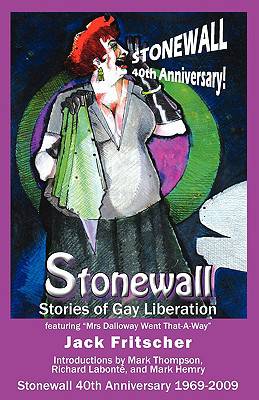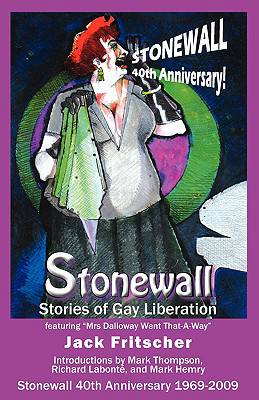
- Retrait gratuit dans votre magasin Club
- 7.000.000 titres dans notre catalogue
- Payer en toute sécurité
- Toujours un magasin près de chez vous
- Retrait gratuit dans votre magasin Club
- 7.000.0000 titres dans notre catalogue
- Payer en toute sécurité
- Toujours un magasin près de chez vous
27,95 €
+ 55 points
Format
Récompenses
Description
"At Stonewall," Jack Fritscher wrote, "gay character changed." In June 1969, the legendary Stonewall Rebellion in New York's Greenwich Village began the national gay civil rights movement. Fritscher, one-time lover of Robert Mapplethorpe and early intimate of elegant Picasso biographer and "Vanity Fair" author John Richardson, is the highly acclaimed novelist, award-winning historian, and polished prose stylist. His best-selling "Some Dance to Remember: A Memoir-Novel of San Francisco 1970-1982" pairs perfectly with his nonfiction tour de force "Gay San Francisco" as "roots" landmarks in gay literature. "The Advocate" said that "Fritscher writes...wonderful books" and that he made "the Castro mythic." In his fiction collection celebrating Stonewall turning forty, Fritscher-turning seventy-unreels nine perfectly crafted stories introduced by literary critics Richard Labonté of A Different Light and by Mark Thompson of "The Advocate." Labonté "A sterling collection...perfectly catches our bitchy bravura." Thompson: "Hilarious, exquisite, empowering stories about how fabulous we are." Editor Mark Hemry selected the tales in this edition to show, first, how Stonewall affected gay culture (on the Gay Axis connecting Stonewall to San Francisco), and, second, how Fritscher in the West Coast school of writing helped build the national aftermath of the East Coast Stonewall. Among fellow authors such as Armistead Maupin, Edmund White, Felice Picano, and the pseudonymous Andrew Holleran, Fritscher is the eldest and the first published (1950s) and is the only lifelong magazine editor, journalist, and photographer. His truly distinctive contribution to GLBT literature has been his widening-precisely with his recurrent themes of humanism and eros-the liminal diversity of the gay literary canon in books such as his controversial memoir of his affair with the much-damned photographer Robert Mapplethorpe in "Mapplethorpe: Assault with a Deadly Camera." "Stonewall " surveys the fictive essence of his 50-year career capturing the character, dialogue, and nuance of the gay culture whose emotional curves he loves. Willie Walker, founder of the GLBT Historical Society of San Francisco, has observed: "Fritscher is a prolific writer who since the late 1960s has helped document the gay world and the changes it has undergone." Guided by a rather good sense of gaydar in this new collection, Fritscher celebrates gay "drama" and diversity and "brilliant gay voices" in these nine tales scanning the curvature of the gay Earth--from the 1906 earthquake in "Meet Me in San Francisco" through the 1969 Stonewall rebellion up to gay marriage in "Mrs. Dalloway Went That-A-Way." Recommended for public and academic libraries, and for special collections of gay literature and GLBT studies, as well as for coffee-house, commute, vacation, and bedside reading. "'Stonewall' is pitch-perfect." Thomas Long, editor, "Harrington Gay Men's Fiction Quarterly," University of Connecticut
Spécifications
Parties prenantes
- Auteur(s) :
- Editeur:
Contenu
- Nombre de pages :
- 256
- Langue:
- Anglais
Caractéristiques
- EAN:
- 9781890834449
- Date de parution :
- 30-12-08
- Format:
- Livre broché
- Format numérique:
- Trade paperback (VS)
- Dimensions :
- 140 mm x 216 mm
- Poids :
- 326 g

Les avis
Nous publions uniquement les avis qui respectent les conditions requises. Consultez nos conditions pour les avis.








